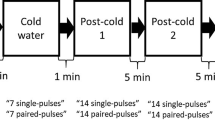Abstract.
We studied remote effects of teeth clenching on motor cortical and spinal cord excitability using transcranial magnetic stimulation (TMS), brainstem electrical stimulation (BES), and ulnar nerve stimulation (F-wave) in eight normal volunteers. The TMS, BES, and ulnar nerve stimulation at the wrist were given at different intervals (0–200 ms) after the onset of masseter contraction. Surface electromyographic responses were recorded from the first dorsal interosseous muscle. Responses at different intervals were compared with the response elicited when the subject made no teeth clenching (control response). In TMS, conditioned responses (during teeth clenching) were significantly larger than the control at all intervals. In contrast, in BES and F-waves, conditioned responses were not larger than the control at an early phase (intervals shorter than 50 ms), whereas they were larger than the control at later intervals (longer than 50 ms). These results suggest that facilitation occurs in the hand motor area at the early phase of teeth clenching, and spinal facilitation dominates at its late phase. This time course of facilitation may indicate that the motor cortex must regulate hand muscles finely at the early phase of teeth clenching, and spinal cord may stabilize them firmly at the late phase. The excitability changes of the hand motor area may be in parallel with that of the masseter motor area which reflects the pattern of masseter contraction when the subject activates the masseter muscle phasically at the early phase and sustains that contraction at the late phase.
Similar content being viewed by others
Author information
Authors and Affiliations
Additional information
Electronic Publication
Rights and permissions
About this article
Cite this article
Furubayashi, T., Sugawara, K., Kasai, T. et al. Remote effects of self-paced teeth clenching on the excitability of hand motor area. Exp Brain Res 148, 261–265 (2003). https://doi.org/10.1007/s00221-002-1299-y
Received:
Accepted:
Issue Date:
DOI: https://doi.org/10.1007/s00221-002-1299-y




